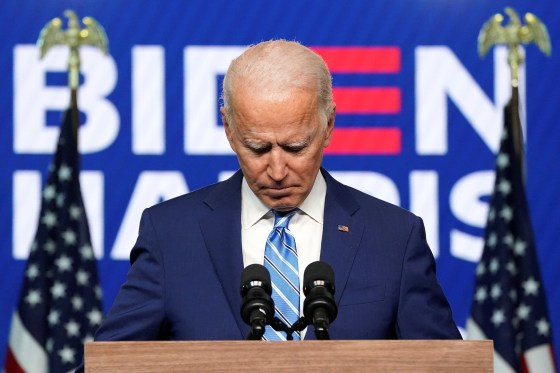WASHINGTON — With Joe Biden on the cusp of 270 electoral votes, it’s time to discuss the political institutions and instruments that the 2020 cycle broke — or demonstrated once again that they were already broken.
- The Iowa caucuses (remember that botched count?).
- The supposed importance of the first three nominating contests (Biden lost them all, but he seems headed to the White House).
- The polls (especially of the state battlegrounds).
- The exit polls (they again were a mess).
- All of the Twitter pundits (who didn’t necessarily reflect the views of Democratic primary voters), plus all of the online misinformation.
- And the Commission on Presidential Debates (remember when Trump pulled out of the second debate?).
- (There’s also an Electoral College system that doesn’t exactly match the popular vote, but that can only change via a constitutional amendment).
All of these institutions and instruments were created in the 20th century — except Twitter, of course — and they became essential parts to how America practices politics. But they no longer seem fit for our modern times.
Should small states really go first in choosing a presidential nominee?
In our changing technological world, how do you better gauge public opinion, especially in a political system where electoral votes in the key battlegrounds — not popular votes from national polls — determine who wins the White House?
When more and more Americans are voting early or by mail, how do you better conduct exit polls and — more importantly — combine the different streams of data (the phone polls for the mail-in votes, early exits, day-of exits)?
Who should be the gatekeepers and custodians of information in our current media ecosystem?
And should an organization that’s not accountable to the public really be charge of organizing and setting the rules for the presidential debates?
Over the last several years, President Trump has tried to smash many of these institutions and instruments, criticizing the polls, undermining the media and pulling out of that presidential debate.
But their performances in 2020 raise an important question: Is it time to reimagine how we choose presidential nominees, gauge public opinion, cover races and hold debates?
Because we’re no longer living in the 20th century.
The major uncalled presidential states as of publication time
- Arizona: Biden 51 percent, Trump 48 percent (86% in)
- Georgia: Trump 50 percent, Biden 49 percent (96% in)
- Michigan: NBC News called it for Biden on Wednesday
- Nevada: Biden 49 percent, Trump 49 percent (86% in)
- North Carolina: Trump 50 percent, Biden 49 percent (95% in)
- Pennsylvania: Trump 51 percent, Biden 48 percent (89% in)
- Wisconsin: NBC News called Biden the apparent winner on Wednesday
Data Download: The numbers you need to know today
3.56 million: Joe Biden’s lead in the popular vote at the time of publication
About 57 percent to 40 percent: Donald Trump’s share over Joe Biden in a batch of votes from Maricopa County late last night
489,323: The estimated remaining vote out in Arizona, where Biden currently leads by about 68,000 votes.
202,085: The estimated remaining vote out in Nevada, where Biden currently leads by about 7,600 votes.
223,862: The estimated remaining vote out in Georgia, where Trump leads by fewer than 19,000 votes
292,412: The estimated remaining vote out in North Carolina, where Trump leads by about 77,000 votes
801,292: The estimated remaining vote out in Pennsylvania, where Trump leads by about 164,000 votes.
78 percent: The share that Biden has gotten of absentee voters in Pennsylvania so far, per the Secretary of State’s office.
9,568,106: The number of confirmed cases of coronavirus in the United States, per the most recent data from NBC News and health officials. (That’s 106,258 more than yesterday morning.)
235,299: The number of deaths in the United States from the virus so far. (That’s 1,728 more than yesterday morning.)
150.97 million: The number of coronavirus tests that have been administered in the United States so far, according to researchers at The COVID Tracking Project.
52,049: The number of people currently hospitalized for Covid-19 in the U.S., per the Covid Tracking Project.
Tweet of the day
2020 Vision: Rose is behind in N.Y. 11
House Democrats haven’t had the election cycle they were hoping for, and rather than gaining seats, they’ve lost several. One of their more vulnerable seats is still up in the air: N.Y. 11.
Rep. Max Rose’s seat — which is composed of Staten Island in New York and parts of Brooklyn — is trailing his Republican challenger by more than 35,000 votes as we wait for the remainder of the vote to trickle in. The challenger, Nicole Malliotakis, declared victory, but Rose hasn’t conceded.
Rose flipped the historically Republican seat in 2018, and while it’s looking less and less likely that he’ll hold onto it, it may take a while to officially call.
Local election boards in New York won’t begin canvassing, or accounting for all the ballots, until Friday at the earliest. After the canvassing is completed, counties can then begin opening absentee ballot envelopes. Plus election boards have until Nov. 10 to accept postmarked absentee ballots.
ICYMI: What else is happening in the world
Here’s our lede-all on NBCNews.com with all of the developments in the last 24 hours.
Jonathan Allen posits that Trump’s rhetoric in the last day shows he believes he’s losing.
Here’s where the Trump campaign is suing and why.
Protests over the ballot count are spreading.
Democrats’ hopes fell short in Texas. Here’s what’s gone wrong for them.
Mitch McConnell says economic stimulus is his top priority for the rest of the year.
Don’t sleep on what the California ride-sharing ballot measure could mean for other states.
Black voters may have saved Biden’s campaign — again.
Congress will have its first gay Black members.




